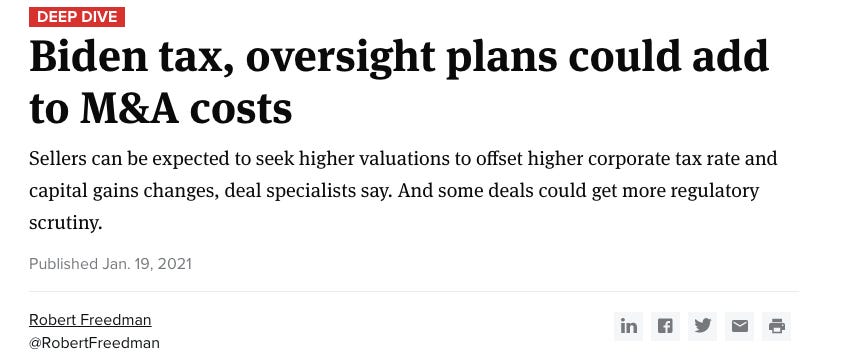One Benefit of Biden's Capital Gains Tax Hike: Fewer Mergers
Joe Biden's tax changes would slow the merger boom, if it passes. And it would hit private equity particularly hard.
Welcome to BIG, a newsletter on the politics of monopoly power. If you’d like to sign up to receive issues over email, you can do so here.
The Democratic Party is very different than it was under Obama, changing as an institutional party from exceptionally friendly to concentrated capital to somewhat hostile to it. It’s not just moving away from bank bailouts and nominating strong antitrust enforcers like Lina Khan. Last week, Joe Biden proposed a capital gains tax hike, from 23.8% to 43.4% for households making more than $1 million. That is, when a very wealthy person sell a financial asset, any gain will now be taxed at a higher rate, roughly the same as the income tax. It’s not just Biden, but is increasingly party-wide. For example, progressive advocate Nick Hanauer just helped move a 7% capital gains tax hike through Washington state.
What’s useful about this particular proposal from an anti-monopoly perspective is that the main tax on mergers and acquisitions is, in fact, capital gains. And when you raise taxes on something, you usually get less of it. There is some research on the interaction between mergers and capital gains taxes. In the European Economic Review, a group of European economists found that “a one percentage point increase in the capital gains tax rate reduces acquisition activity by around 1% annually.” A different set of scholars examined mergers from 1973-2001 and discovered that there is “a significant negative association between corporate acquisitions and the capital gains tax rate.”
In other words, mergers drop when it’s less profitable to sell companies. To put it in more practical terms, here’s one headline, from CFO Dive, a trade publication on finance.
Not all mergers would be taxed at a higher rate, of course. If a corporation sells itself at a loss, a higher capital gains rate won’t matter. And if a corporation sells itself for stock, swapping stock for stock, there’s no taxable event. A lot of big mergers work this way. But if there’s cash involved in an acquisition, then any gains on such an acquisition will be taxable at a higher rate. And guess who buys firms for cash? Private equity. that’s what private equity does, it puts cash to work. That means that sellers of firms to private equity in particular are going to want higher prices to make up for the difference, and mergers will slow.
This would a very good thing. Aside from taxing labor and capital equally, this capital gains will encourage investors to move money out of assets that produce capital gains, and into assets that offer dividends. Too much of our investing activity is dedicated to asset inflation rather than investing in lines of business that generate revenue. A capital gains tax hike won’t fix everything, and slowing this merger boom is more of a side effect than a main effect. But it’s still quite useful.


